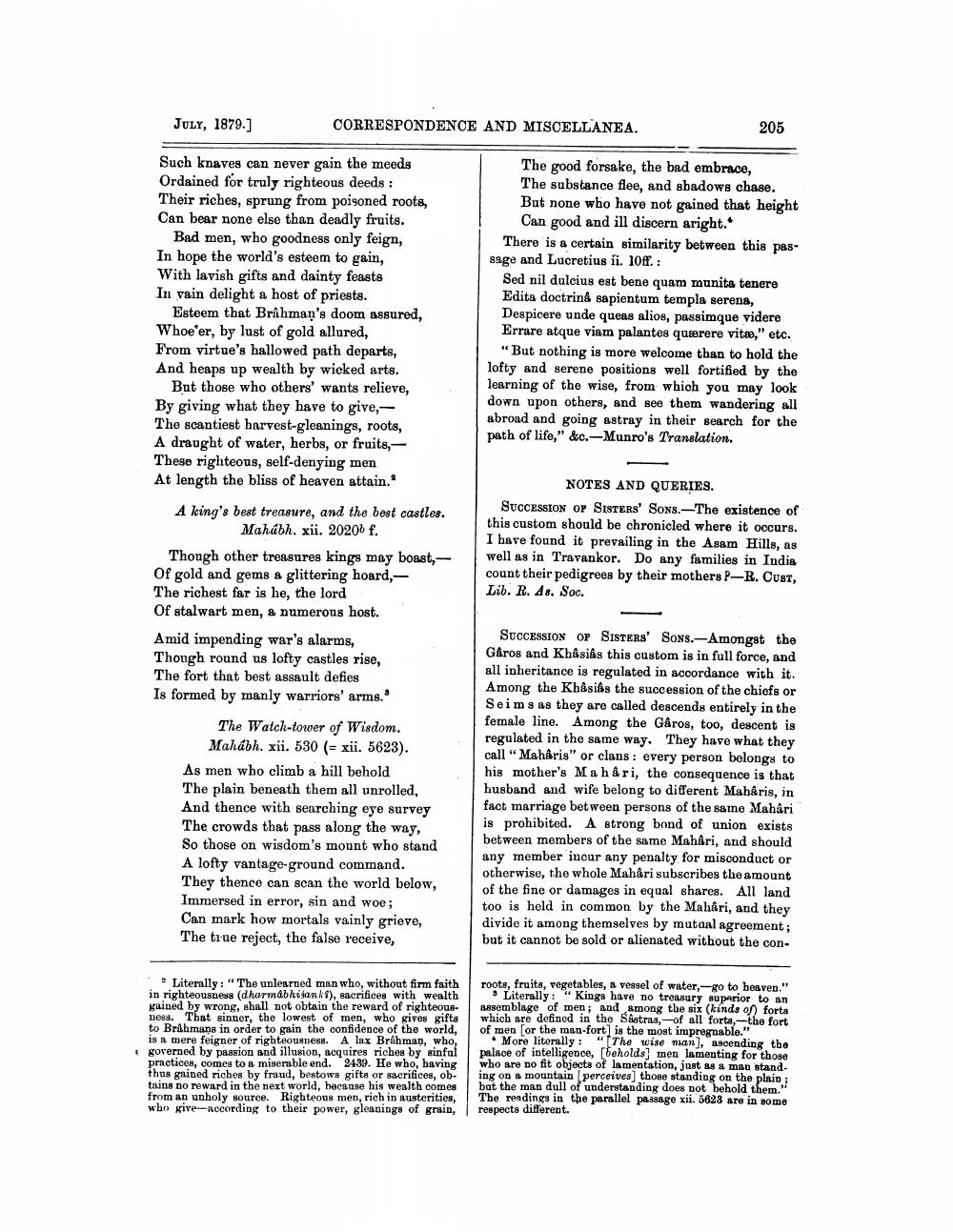________________
JULY, 1879.)
CORRESPONDENCE AND MISCELLANEA.
205
Such knaves can never gain the meeds Ordained for truly righteous deeds : Their riches, sprung from poisoned roots, Can bear none else than deadly fruits.
Bad men, who goodness only feign, In hope the world's esteem to gain, With lavish gifts and dainty feasts In vain delight a host of priests.
Esteem that Brahman's doom assured, Whoe'er, by lust of gold allured, From virtue's hallowed path departs, And heaps up wealth by wicked arts.
But those who others' wants relieve, By giving what they have to give, The scantiest barvest-gleanings, roots, A draught of water, herbs, or fruits, These righteous, self-denying men At length the bliss of heaven attain."
The good forsake, the bad embrace, The substance flee, and shadows chase. But none who have not gained that height
Can good and ill discern aright. There is a certain similarity between this passage and Lucretius ii. 10ff. :
Sed nil dulcius est bene quam munita tenere Edita doctrinâ sapientum templa serena, Despicere unde queas alios, passimque videre Errare atque viam palantes quærere vitæ," etc.
"But nothing is more welcome than to hold the lofty and serene positions well fortified by the learning of the wise, from which you may look down upon others, and see them wandering all abroad and going astray in their search for the path of life," &c.-Munro's Translation.
NOTES AND QUERIES. SUCCESSION OP SISTERS' Sons.-The existence of this custom should be chronicled where it occurs. I bave found it prevailing in the Asam Hills, as well as in Travankor. Do any families in India count their pedigrees by their mothers P-R. Cust, Lib. R. 18. Soc.
A king's best treasure, and the best castles.
Mahábh. xii. 20200 f. Though other treasures kings may boast, Of gold and gems a glittering hoard, - The richest far is he, the lord Of stalwart men, a numerous host. Amid impending war's alarms, Though round us lofty castles rise, The fort that best assault defies Is formed by manly warriors' arms."
The Watch-tower of Wisdom.
Mahábh. xii. 530 (= xii. 5623). As men who climb a hill behold The plain beneath them all unrolled, And thence with searching eye survey The crowds that pass along the way, So those on wisdom's mount who stand A lofty vantage-ground command. They thence can scan the world below, Immersed in error, sin and woe; Can mark how mortals vainly grieve, The true reject, the false receive,
SUCCESSION OP SISTERS' Sons.-Amongst the Gåros and Khasiâs this custom is in full force, and all inheritance is regulated in accordance with it. Among the Khasis the succession of the chiefs or Seims as they are called descends entirely in the female line. Among the Gâros, too, descent is regulated in the same way. They have what they call "Maharis" or claus: every person belongs to his mother's Ma hâri, the consequence is that husband and wife belong to different Maharis, in fact marriage between persons of the same Mahari is prohibited. A strong bond of union exists between members of the same Mahâri, and should any member incur any penalty for misconduct or otherwise, the whole Mahari subscribes the amount of the fine or damages in equal shares. All land too is held in common by the Mahari, and they divide it among themselves by mutaal agreement; but it cannot be sold or alienated without the con
Literally: "The unlearned man who, without firm faith in righteousness (dharmabhisankf), sacrifices with wealth Kuined by wrong, shall not obtain the reward of righteous ness. That sinner, the lowest of men, who gives gifta to Brahmans in order to gain the confidence of the world, is a mere feigner of righteousness. A lax Brahman, who, governed by passion and illusion, acquires riches by sinful practices, comes to a miserable end. 2439. He who, having thus gained riches by fraud, bestows gifts or sacrifices, obtains no reward in the next world, because his wealth comes from an unholy source. Righteous men, rich in austerities, who give-recording to their power, gleanings of grain,
roots, fruits, vegetables, & vessel of water, -go to heaven."
Literally: "Kings have no treasury superior to an assemblage of men and among the six (kinds o) forta which are defined in the Sastras, -of all forta,--the fort of men (or the man-fort) is the most impregnable."
• More literally: "The wise nar), ascending the palace of intelligence, [beholds) men lamenting for those who are no fit objects of lamentation, just as a man standing on a mountain perceives) those standing on the plaid ; but the man dull of understanding does not behold them." The rendings in the parallel passage xii. 5628 are in some respecta different.




